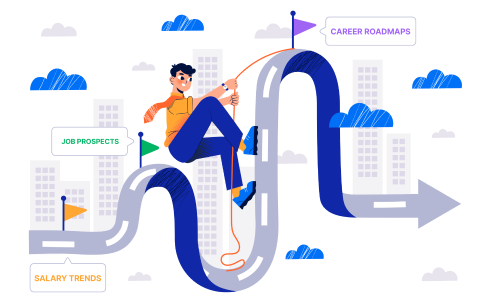5 Big Data Predictions What To Look For In 2015
Summary
Big data technology is rapidly advancing in 2015 with key developments on the horizon. Data agility gains importance, shifting focus from data storage to active usage. Data platforms and lakes evolve to include multiple execution engines, promoting real-time processing. Self-service big data becomes mainstream, empowering users for direct data exploration. Enterprise architects play a crucial role in refining big data adoption strategies, and enterprise software companies enter the scene to address gaps in Hadoop-based governance and data management.
Table of Content
Big data analytics and technologies are evolving at a torrid pace and show no sign of ebbing in 2015. Here, we take a quick look at five major developments that will dominate the world of big data technology this year.
In the past few years, technologies linked to big data have surpassed the realms of hype to bring about revolutionary changes in the new digital age. The year 2014 had witnessed organizational big data initiatives moving from test to production. According to John Schroeder, co-founder and CEO of Hadoop distribution, in 2015, big data is expected to push further into enterprises and boast of many more user cases. Read on for some important big data predictions and what they hold in store.
Major Big Data Developments in Store
Data Agility Emerges as Primary Focus
After the processes that are centric to data warehouses and legacy databases have proved to be inflexible and slow for most business needs, data agility has taken over as one of the key drivers influencing the unprecedented increase in popularity of big data technologies. It is predicted that data agility will have a greater say in organizations, especially when they start shifting their focus from managing and capturing data to actively using the same.
Schroeder says, "Initial big data projects are focused on the storage of target data sources, rather than laying focus on how much data is being managed. Organizations will now move their focus to measuring data agility. How does the ability to process and analyze data impact operations? How quickly can they adjust and respond to changes in customer preferences, market conditions, competitive actions and the status of operations? These questions will direct the investment and scope of big data projects in 2015." (also consider checking out this perfect parcel of information for a data science degree).
Processing Data Platforms and Data Lakes to Evolve Further
In certain ways, 2014 has served as the year of the data hub or data lake, which is typically an object-based repository for the storage of raw data in its native format. The stored data is unstructured, semi-structured or structured, until ready for use (Here's the perfect parcel of information to learn data science). Data lakes deliver strong value propositions as they represent scalable infrastructural capabilities that are extremely agile and economically attractive.
These stoic data platforms and lakes will continue to evolve with the additional capability of bringing in multiple execution engines for computing and processing the data in-place. Along with being more efficient, they will create better modules for governance and security, move organizations to real-time processing, and help in the incorporation of database engines, Hadoop and other large-scale processing platforms. This big trend on big data will encourage continuous processing of events and access in real time; so as to generate constant awareness and help users take immediate actions.
Big Data: Self-Service Goes Mainstream
In 2015, self-service big data will be embraced by IT to help users enjoy easy access to the tools and techniques of the former. Self-service will empower data scientists, developers, and data analysts to carry out data exploration directly. Earlier, IT was an essential requirement for establishing centralized data structures and was considered as an expensive and time-consuming step. Advanced organizations are now moving towards data bindings (on execution) and deflecting from central structures for fulfilling their ongoing requirements. Overall, self-service will be speeding organizations in their abilities of leveraging new data sources and/ or responding to diverse opportunities and threats.
Big Hype Separated from Big Data by Enterprise Architects
According to Schroeder, "As organizations move quickly beyond experimentation to serious adoption in the data center, enterprise architects move front and center into the big data adoption path.”
One of the biggest big data predictions for 2015 reveals that enterprise architects will take center stage after improving upon their understanding of Hadoop technology. This will lead to a more sophisticated and better defined statement of requirements and solutions for big data applications; which include elements such as business continuity and high availability. With this in view, IT leaders will play an essential role in delivering business continuity and high availability or determining the architectures essential for meeting SLAs and mission-critical needs.
While 2014 concentrated on the booming ecosystem developing around Hadoop--with a proliferation of tools, applications, and components--the market is expected to lay focus on the differences across the platforms (as well as the architecture) needed for integrating Hadoop into data centers, and delivering better business results (also consider checking out this career guide for data science jobs).
Enterprise Software Companies will Move In
Hadoop, a general-purpose platform, stores, and processes just about any kind of data. However, Hadoop-based governance and data management solutions have their own gaps. Reputed enterprise software companies like SAS Institute, Oracle, Microsoft, Talend, IBM, BMC, Informatica, Teradata, and Protegrity are coming into the fray to take care of these gaping holes. They are making an impact by introducing big data analytics and technology management processes that require specialized tools native to Hadoop and other programming languages.





